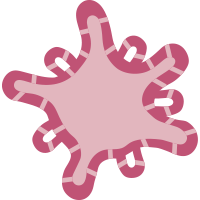
Organoid News
Organoid News is an online resource dedicated to the latest research about and featuring organoids.
Development and Intra-Renal Delivery of Renal Progenitor Organoids for Effective Integration In Vivo
[Stem Cells Translational Medicine] iPSCs were differentiated into renal progenitor cells using an established protocol and aggregated using a novel assembly method to produce high yields of organoids.
Development of iPSC-Derived Human Bone Marrow Organoid for Autonomous Hematopoiesis and Patient-Derived HSPC Engraftment
[Blood Advances] Researchers developed an iPSC-derived human bone marrow organoid model that closely replicated the bone marrow microenvironment, facilitating the engraftment of myelodysplastic syndrome patient-derived hematopoietic stem and progenitor cells.
Automated Live-Cell Single-Molecule Tracking in Enteroid Monolayers Reveals Transcription Factor Dynamics Probing Lineage-Determining Function
[Cell Reports] To probe transcription factor function by measuring their dynamics during adult intestinal homeostasis, researchers established highly inclined and laminated optical sheet-illumination-based live-cell single-molecule tracking in mouse small intestinal enteroid monolayers recapitulating tissue differentiation hierarchies in vitro.
Human Organoids and Organ-on-Chips in Celiac Disease Research
[Trends in Molecular Medicine] Investigators discuss disease complexity, recent advances in stem cell biology, organoids, tissue co-cultures, and organ-on-chip systems that facilitate the development of comprehensive human model systems, and model applications in preclinical studies of potential treatments.
Tempus Announces Collaboration with JW Pharmaceutical to Apply Real-World Data and Biological Modeling to Enhance Early Research and Development
[Tempus] Tempus announced a collaboration with JW Pharmaceutical to leverage both real-world data and biological modeling to support efficient hypothesis generation and rapid validation in early therapeutic research in oncology.
The GTPase RAB6 Is Required for Stem Cell Maintenance and Cell Migration in the Gut Epithelium
[Development] Researchers investigated the role of RAB6 in the development and maintenance of the gut epithelium. They generated conditional knockout mice with RAB6 specifically deleted in the gut epithelium.
Progressive Plasticity during Colorectal Cancer Metastasis
[Nature] In a cohort of biospecimen trios from same-patient normal colon, primary and metastatic colorectal cancer, investigators showed that, although primary tumors largely adopted LGR5+ intestinal stem-like states, metastases displayed progressive plasticity.
Tumor Organoids Improve Mutation Detection of Pancreatic Ductal Adenocarcinoma
[Scientific Reports] Researchers investigated the utility of patient-derived organoids (PDOs) to overcome the obstacles of detecting somatic mutations and enhance somatic mutation identification. Surgically resected pancreatic ductal adenocarcinoma tumors and their paired PDOs from 21 patients were examined.
METTL3 Confers Oxaliplatin Resistance Through the Activation of G6PD-Enhanced Pentose Phosphate Pathway in Hepatocellular Carcinoma
[Cell Death & Differentiation] Employing siRNA library screening, scientists identified that silencing the m6A writer methyltransferase-like 3 (METTL3) significantly enhanced the sensitivity to oxaliplatin in both in vivo and in vitro hepatocellular carcinoma models.
p53 Terminates the Regenerative Fetal-Like State After Colitis-Associated Injury
[Science Advances] Scientists used murine and organoid-based models to study the role of Trp53 during epithelial reprogramming.
Influence of Microenvironmental Orchestration on Multicellular Lung Alveolar Organoid Development from Human Induced Pluripotent Stem Cells
[Stem Cell Reviews and Reports] iPSCs were differentiated into mature lung organoids following a stepwise protocol in an oxygen and pressure-controlled microenvironment. The organoids developed in the controlled microenvironment displayed complex alveolar architecture and stained for SFTPC, PDPN, and KRT5, indicating the presence of alveolar epithelial type II and type I cells, as well as basal cells.
The Neuroendocrine Transition in Prostate Cancer Is Dynamic and Dependent on ASCL1
[Nature Cancer] Transplanted mouse prostate organoids with human-relevant driver mutations develop adenocarcinomas, but only those with Rb1 deletion advance to aggressive, ASCL1+ neuroendocrine prostate cancer resistant to androgen receptor signaling inhibitors.
Organoids are three-dimensional cell cultures that more accurately model cell behavior, organ function, and pathology than traditional two-dimensional cell culture. Organoid News was launched in 2020 to help scientists stay up-to-date with this revolutionary new research system. Use Organoid News to stay current with the latest applications and discoveries using organoids, as well as new reviews, jobs, news, and upcoming events.

 Cancer Stem Cell News
Cancer Stem Cell News Cell Therapy News
Cell Therapy News Dermal Cell News
Dermal Cell News Endothelial Cell News
Endothelial Cell News ESC & iPSC News
ESC & iPSC News Extracellular Matrix News
Extracellular Matrix News Hematopoiesis News
Hematopoiesis News Hepatic Cell News
Hepatic Cell News Human Immunology News
Human Immunology News Immune Regulation News
Immune Regulation News
 Intestinal Cell News
Intestinal Cell News Mammary Cell News
Mammary Cell News Mesenchymal Cell News
Mesenchymal Cell News Muscle Cell News
Muscle Cell News Neural Cell News
Neural Cell News Organoid News
Organoid News Pancreatic Cell News
Pancreatic Cell News Prostate Cell News
Prostate Cell News Pulmonary Cell News
Pulmonary Cell News
